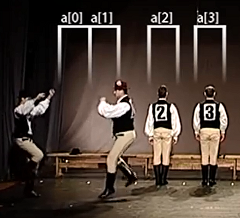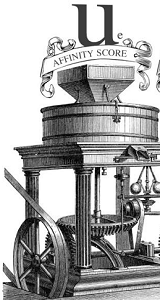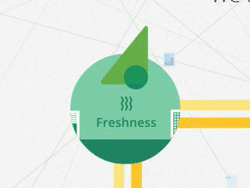


Algorithmic Culture


SI 710.004 / COMM 820.001 -- Fall 2016
Prof. Sandvig, University of Michigan
http://710.niftyc.org/
"[There is a] need to create a new field around the social algorithm, which examines the interplay of social and computational code."
–David Lazer (2015)
"'Algorithm studies' is the critical study of the social, political and cultural life of the algorithm and its conditions of change, evolution and possibility."
–Jenna Ng and David Theo Goldberg (2015)
"That we are now turning to algorithms to identify what we need to know is as momentous as having relied on credentialed experts, the scientific method, common sense, or the word of God."
–Tarleton Gillespie (2015)
"An algorithm must be seen to be believed, and the best way to learn what an algorithm is all about is to try it."
–Donald Knuth (1968)
Announcements
- Welcome to the class!
- Please answer the weekly question one hour before class begins.
About the Class
Instructor
Prof. Christian Sandvig
csandvig@umich.edu
734/763-0861
http://www.niftyc.org/
Office: 5385 North Quad
My mailbox is in the 3rd floor School of Information mailbox area, in the 3rd floor kitchen (3351 North Quad)
Office Hours: 1:00-2:00 p.m. Tuesdays and by appointment
Course Description
The humanistic and social scientific study of information and communication technologies is fundamentally concerned with one problem: these socio-technical systems shape what we experience. This concern is longstanding, worries about technology, automation and computerization have a long history, and "algorithm" is a very old word. Yet recently there has been an explosion of new scholarly work examining algorithms and culture, a pairing of two topics that many people find at least 50% mysterious. Researchers claim that the contemporary use of automated ("algorithmic") systems to produce, consume, curate, mediate, store, and sell social and cultural life heralds a set of pivotal transformations for culture itself. To investigate these latest claims, this course surveys contemporary research that considers the implications of computational processes that treat culture as data. We will draw from science and technology studies, information science, anthropology, communication, media studies, legal theory, sociology, and computer science, with additional contributions from psychology and philosophy. Although we will consider "natively algorithmic" digital cultural products (such as digital experiences like social media and video games), our overall goal will be to examine the potential transformation of any form of culture. Due to our multidisciplinary approach, no particular technical, humanistic, or social scientific background is required.
Learning Objectives
- Pose intellectual questions about algorithms and culture that demonstrate an understanding of both domains
- Practice reading across disciplinary boundaries in a topical area where a large amount of new work is appearing and boundaries and definitions remain fluid
- Take an informed position on the intellectual debates important to this developing field of knowledge
- Relate future developments in the area of algorithmic culture to existing, enduring intellectual frames and ideas
- Write a scholarly research paper equivalent to a conference paper in a sub-discipline relevant to this topic and relevant to your intellectual development
Course Credit
- Students from other programs (not SI or COMM) are welcome.
- This course is intended for doctoral students. Other graduate students may enroll by instructor permission if there is a good reason to do so.
Class Requirements
Students will be responsible for a seminar paper proposal due midway through the term and a (research) seminar paper of about 25 double-spaced pages due at the end of term. A seminar paper should be similar in scope and format to a scholarly conference paper. In addition, there will be short assignments ("weekly questions") due one hour before the beginning of each class meeting when reading is assigned. These will be read and discussed in class but not graded. All assignments will be turned in electronically.
No late work! No incompletes! (Without cause.)
Required Books
There are no required books. Readings will be distributed electronically. These are either free on the Web or use password-protected links to PDFs stored in Canvas.
Recommended Books
These books are recommended in the sense that every doctoral student working in the social sciences and humanities should own them already. If you don't own them, you should buy them! They are highly recommended.
- Howard S. Becker & Pamela Richards. (2007). Writing for Social Scientists: How to Start and Finish Your Thesis, Book, or Article. Chicago: University of Chicago Press. (any edition is fine.) [Note that although the phrase "social scientist" is in the title of the book, this book is equally relevant to researchers from the humanities who don't identify with that phrase.]
- William Strunk, Jr. & E. B. White. (2000). The Elements of Style. New York: Longman. (Any edition is fine except for the 1920 or 2011 "Original Edition" that does not include E. B. White. Be sure it has E. B. White. If it has Kalman as a co-author too, I think that is OK -- this just means it is the illustrated edition.)
Schedule
These dates and readings will be adjusted to reflect our progress (or lack of it). Topics marked with (*) exist due to student demand and are organized with student suggestions.
This means that you should check the class Web site regularly for updates.
Part I: An Overview of Orthodoxy and Research Methods
12 Sep (Mon): Introduction
- Please carefully read the syllabus.
19 Sep (Mon): What's the Problem? Why Study Algorithms and Culture?
- Please post your weekly question one hour before class begins.
- Pasquale, Frank. 2015. The Black Box Society: The Secret Algorithms That Control Money and Information. Cambridge: Harvard University Press.
26 Sep (Mon): What are algorithms? What are cultural algorithms?
- Please post your weekly question one hour before class begins.
- Wangsness, T. and J. Franklin. 1966. "Algorithm" and "formula." Communications of the ACM 9(4), 243. (and 2 replies)
- Mahnke, Martina and Emma Uprichard. 2014 "Algorithming the Algorithm." In Society of the Query Reader: Reflections on Web Search. René König and Miriam Rasch, eds. Amsterdam: Institute of Network Cultures.
- Kitchin, Rob. 2017. "Thinking Critically about and Researching Algorithms." Information, Communication, and Society 20(1).
- Gillespie, Tarleton. 2014. "The Relevance of Algorithms." In Media Technologies: Essays on Communication, Materiality, and Society, edited by Tarleton Gillespie, Pablo Boczkowski, and Kirsten Foot, 167-194. Cambridge, MA: MIT Press.
- Ziewitz, Malte. 2015. "Governing Algorithms: Myth, Mess, and Methods." Science, Technology & Human Values.
- Striphas, Ted. 2015. "Algorithmic Culture." European Journal of Cultural Studies 18(4-5): 395-412.
- OPTIONAL: Gillespie, Tarleton. (2016). "Algorithm." In Digital Keywords, edited by Ben Peters. Princeton, N.J.: Princeton University Press.
- OPTIONAL: Blass, A. & Gurevich, Y. (2003). Algorithms: A Quest for Absolute Definitions. Bulletin of the European Association for Theoretical Computer Science 81.
3 Oct (Mon): How should we conceptualize "culture" itself?
- Please post your weekly question one hour before class begins.
- Striphas, Ted. 2014. Culture. In: Digital Keywords. Ben Peters (ed.)
- Castells, Manuel. 2000. Materials for an exploratory theory of the network society. British Journal of Sociology 51(1): 5-24.
- Terranova, Tiziana. 2004. Network Culture. Pluto Press: London. (excerpts.)
- Wilf, Eitan. 2013. "Toward an Anthropology of Computer-Mediated, Algorithmic Forms of Sociality." Current Anthropology 54(6): 716-739.
- Striphas, Ted. 2014. "Culture now has two audiences: People and Machines."
- OPTIONAL: Gans, Herbert J. 1999. Popular Culture and High Culture. 2nd ed. Basic Books: New York. (excerpts.)
- OPTIONAL: Adorno, T., & Horkheimer, M. Dialectic of Enlightenment. Edmund Jephcott, trans. Stanford University Press (1947/2002). (excerpts.)
- OPTIONAL: Benjamin, Walter. 1936/1961. The Work of Art in the Age of Mechanical Reproduction. Harry Zohn, trans. (excerpt.)
- OPTIONAL: Williams, Raymond. 1958. Culture is Ordinary. London: Verso. (excerpt.)
10 Oct (Mon): What new methods are being developed to investigate algorithmic systems? What is algorithm auditing?
- Please post your weekly question one hour before class begins.
- Bogost, I. (2012). Alien Phenomenology: or, What It's Like to Be a Thing. Minneapolis: University of Minnesota Press. (Ch. 4: Carpentry -- N.B.: "OOO" stands for Object-Oriented Ontology .)
- Ch. 5: "Search as Research: Source Distance and Cross-Spherical Analysis". In: Rogers, R. (2013). Digital Methods. Cambridge, MA: MIT Press.
- Sandvig, Christian, Kevin Hamilton, Karrie Karahalios, and Cedric Langbort. forthcoming. "Auditing Algorithms: Research Methods for Detecting Discrimination on Internet Platforms." Computational Culture.
- Sweeney, L. (2013). Discrimination in Online Ad Delivery ACM Queue 11(3): 1-19.
- Edelman, B. (2011). Bias in Search Results? Diagnosis and Response. Indian Journal of Law and Technology 7: 16-32.
- Hannak, A., Soeller, G., Lazer, D., Mislove, A., Wilson, C. (2014). Measuring Price Discrimination and Steering on E-commerce Web Sites. ACM SIGCOMM/SIGMETRICS Internet Measurement Conference (IMC ’14).
- Mathias Lecuyer, Guillaume Ducoffe, Francis Lan, Andrei Papancea, Theofilos Petsios, Riley Spahn, Augustin Chaintreau, and Roxana Geambasu. (2014). "XRay: Increasing the Web’s Transparency with Differential Correlation." Technical report. Columbia University.
- OPTIONAL: Ratto, Matt. 2011. "Critical Making: Conceptual and Material Studies in Technology and Social Life." The Information Society 27 (4): 252–60.
17 Oct (Mon): NO CLASS (Fall Study Break)
24 Oct (Mon): How do "users" (or "algorithmic subjects") experience and think about algorithms and culture?
- Please post your weekly question one hour before class begins.
- Sandvig, Christian. 2015. "Seeing the Sort: The Aesthetic and Industrial Defense of ‘The Algorithm.’" Media-N
- Ned Rossiter and Soenke Zehle. 2015. The Aesthetics of Algorithmic Experience. In: Randy Martin (ed.), The Routledge Companion to Art and Politics, New York: Routledge.
- Lustig, Caitlin, and Nardi, Bonnie. 2015. "Algorithmic Authority: The Case of Bitcoin." 48th Hawaii International Conference on System Sciences (HICSS), 743-752.
- Emilee Rader and Rebecca Gray. 2015. Understanding User Beliefs About Algorithmic Curation in the Facebook News Feed. In Proceedings of the 33rd Annual ACM Conference on Human Factors in Computing Systems (CHI ’15). 173–182.
- Eslami, Motahhare, Vaccaro, Kristen, Rickman, Aimee, Hamilton, Kevin, Sandvig, Christian, and Karahalios, Karrie. 2015. First I "like" it, then I hide it: Folk Theories of Social Feeds. CHI 2016.
- Cosley, D., Lam, S.K., Albert, I., Konstan, J.A. and Riedl, J. 2003. Is seeing believing? How recommender system interfaces affect users’ opinions. In: Proceedings of the conference on Human Factors in Computing Systems, pp. 585–592
- OPTIONAL: Dietvorst, Berkeley, Simmons, Joseph, and Massey, Cade. 2014. "Algorithm Aversion: People Erroneously Avoid Algorithms after Seeing Them Err (July 6,). Forthcoming in Journal of Experimental Psychology
31 Oct (Mon): How do "technologists" or "developers" experience and think about algorithms and culture?
- Please post your weekly question one hour before class begins.
- Ch. 2: The Black Art of Programming. (and additional excerpt.) From: Ensmenger, N. 2012. The Computer Boys Take Over. Cambridge: MIT Press.
- Ch. 3: Configuring the User. From: Grint, K. & Woolgar, S. 1997. The Machine at Work. London: Polity.
- Ensmenger, Nathan. 2012. "Is Chess the Drosophila of Artificial Intelligence? A Social History of an Algorithm." Social Studies of Science 42(1): 5-30.
- Sterne, Jonathan. 2006. "The mp3 as cultural artifact." New Media & Society. 8(5): 825-842.
- Schüll, Natasha Dow. 2014. Addiction by Design: Machine Gambling in Las Vegas. Reprint edition. Princeton, NJ: Princeton University Press. (excerpts.)
- Seaver, Nick. 2013. "Knowing Algorithms." In Media in Transition 8. Cambridge, MA.
- Seaver, Nick. 2014. On Reverse Engineering.
7 Nov (Mon): Seminar Paper Proposal Workshop Day
- Seminar paper proposal due.
7 Nov (Mon): What challenges and opportunities does machine learning pose in a cultural context?
- Please post your weekly question one hour before class begins.
- Domingos, P. (2012). A few useful things to know about machine learning. Communications of the ACM, 55(10), 78.
- Wallach, Hannah. 2014. Big Data, Machine Learning, and the Social Sciences. NIPS 2014 workshop keynote.
- Burrell, Jenna. 2015. "How the Machine ‘Thinks:’ Understanding Opacity in Machine Learning Algorithms." Working paper.
- Hallinan, Blake, and Ted Striphas. 2014. "Recommended for You: The Netflix Prize and the Production of Algorithmic Culture." New Media & Society.http://nms.sagepub.com/content/early/2015/02/02/1461444814538646
- Mackenzie, Adrian. 2015. "The Production of Prediction: What Does Machine Learning Want?" European Journal of Cultural Studies 18(4/5): 429–45.
- Tidings of Comfort and Joy: The Seven Wise Men and the Science of Economics (book chapter) Ch. 5 of "The Golem at Large" (1998). by Harry Collins and Trevor Pinch. Cambridge University Press.
- OPTIONAL: Mackenzie, Adrian. Machine Learning and Genomic Dimensionality: From Features to Landscapes. In: Postgenomics: perspectives on biology after the genome. ed. / Sarah Richardson; Hallam Stevens. Durham, N.C. : Duke University Press, 2015. p. 73–102.
14 Nov (Mon): Is algorithmic judgement inhuman? What would that mean?
- Please post your weekly question one hour before class begins.
- Napoli, Philip M. 2014. "On Automation in Media Industries: Integrating Algorithmic Media Production into Media Industries Scholarship." Media Industries 1(1).
- Sharkey, N., Suchman, L. 2013. Wishful mnemonics and autonomous killing machines. In: Proceedings of the AISB. 136, p. 14-22.
- Neyland, Daniel. 2015. "On Organizing Algorithms." Theory, Culture & Society 32(1): 119-132.
- Pasquale, Frank. 2015. "The Algorithmic Self." 17(1) The Hedgehog Review.
- Thrift, Nigel, and Shaun French. 2002. "The Automatic Production of Space." Transactions of the Institute of British Geographers 27(3): 309-335.
- OPTIONAL: McQuillan, Daniel. 2015. "Algorithmic States of Exception." European Journal of Cultural Studies 18(4/5).
21 Nov (Mon): What data and/or metrics do cultural algorithms require? Are there new kinds of quantification because of cultural algorithms? (*)
- Please post your weekly question one hour before class begins.
- Grosser, Ben. (2012). Facebook Demetricator. (video; 2:51)
- (more readings TBD!)
28 Nov (Mon): How can algorithmic processes provide accountability? How are algorithms governed?
- Please post your weekly question one hour before class begins.
- Data & Society Research Institute. 2014 "Workshop Primer: Algorithmic Accountability" http://www.datasociety.net/pubs/2014-0317/AlgorithmicAccountabilityPrimer.pdf
- Pasquale, Frank. 2006. "Rankings, Reductionism, and Responsibility" Cleveland State Law Review, 54:115+. http://digitalcommons.law.umaryland.edu/fac_pubs/1351/
- Citron, Danielle Keats, and Frank A. Pasquale. 2014. "The Scored Society: Due Process for Automated Predictions." Washington Law Review 89. http://papers.ssrn.com/sol3/papers.cfm?abstract_id=2376209
- boyd, danah, Karen Levy, and Alice Marwick. 2014. "The Networked Nature of Algorithmic Discrimination." Open Technology Institute. http://www.danah.org/papers/2014/DataDiscrimination.pdf
- Diakopoulos, Nicholas. 2015. ‘‘Algorithmic Accountability.’’ Digital Journalism 3 (3): 398-415. http://www.nickdiakopoulos.com/wp-content/uploads/2011/07/algorithmic_accountability_final.pdf
- Medina, Eden. 2015. "Rethinking algorithmic regulation", Kybernetes, Vol. 44(6/7): 1005-1019. http://www.emeraldinsight.com/doi/abs/10.1108/K-02-2015-0052
- OPTIONAL: Saurwein, Florian, Just, Natascha, Latzer, Michael. 2015. "Governance of algorithms: options and limitations." Info, Vol. 17 (6), 35-49.
- OPTIONAL: Grimmelmann, James. 2008. "The Google Dilemma." New York Law School Law Review, 53: 939.
5 Dec (Mon): Are there basic/fundamental limits, weaknesses, and/or "blind spots" for machine learning and/or algorithms related to culture? (*)
- Please post your weekly question one hour before class begins.
- OPTIONAL: Panel Discussion: What Can't We Predict with Math? World Science Festival. (video; 5 min.)
- (more readings TBD!)
12 Dec (Mon): Summing up: What is the role of algorithms in cultural theory?
- Please post your weekly question one hour before class begins.
- Manovich, Lev. 2013. Software Takes Command. New York: Bloomsbury Academic. (excerpts)
- Soderman, Braxton. 2007. "The Index and the Algorithm." differences 18(1): 153–86.
- Beer, David. 2013. "Algorithms: Shaping Tastes and Manipulating the Circulations of Popular Culture." In Popular Culture and New Media: The Politics of Circulation. Palgrave McMillan.
- Totaro, Paolo, and Ninno, Domenico. 2014. "The Concept of Algorithm as an Interpretative Key of Modern Rationality." Theory, Culture & Society 31 (4): 29-49.
- Galloway, A. R. (2014). The Cybernetic Hypothesis. differences 25(1): 107-131.
- OPTIONAL: Mager, Astrid. 2012. "Algorithmic Ideology: How Capitalist Society Shapes Search Engines." Information, Communication & Society. 15(5) 769-787.
- OPTIONAL: Uricchio, William. 2015. "Recommended for You: Prediction, Creation and the Cultural Work of Algorithms." The Berlin Journal, 28: 6-9
21 Dec (Wed): Final paper due
Final paper due at 10:00 a.m.
This is the end of the scheduled final exam period for this course according to the registrar's office. Submitting the paper will count as the final examination for this seminar; there is no other final examination. Submit your paper via e-mail to the instructor.

(tl;dr)